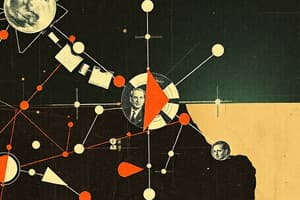Podcast
Questions and Answers
Each element has its own box, and within that box, you will find two numbers. The atomic number, or proton number, and the mass number, but what do these numbers mean. The atomic number has the symbol 'z', this number tells you how many protons are in one atom of an element. The number is always the same for all atoms of a particular element. Atoms of different elements have different atomic numbers, meaning they have different numbers of protons. For example, an atom of Hydrogen has an atomic number of 1 because it has 1 proton, but an atom of Oxygen has and atomic number of 8 because it has 8 protons. The next number we look at is the mass number. The mass number has the symbol A. This mass number tells you how many protons AND neutrons are in one atom of an element. We need to remember that Protons and Neutrons each have a relative mass of 1 and that Electrons are so small, that their mass does not need to considered in the mass.
Each element has its own box, and within that box, you will find two numbers. The atomic number, or proton number, and the mass number, but what do these numbers mean. The atomic number has the symbol 'z', this number tells you how many protons are in one atom of an element. The number is always the same for all atoms of a particular element. Atoms of different elements have different atomic numbers, meaning they have different numbers of protons. For example, an atom of Hydrogen has an atomic number of 1 because it has 1 proton, but an atom of Oxygen has and atomic number of 8 because it has 8 protons. The next number we look at is the mass number. The mass number has the symbol A. This mass number tells you how many protons AND neutrons are in one atom of an element. We need to remember that Protons and Neutrons each have a relative mass of 1 and that Electrons are so small, that their mass does not need to considered in the mass.
Each element has its own ______
Each element has its own ______
box
The atomic number has the symbol '______', this number tells you how many protons are in one atom of an element.
The atomic number has the symbol '______', this number tells you how many protons are in one atom of an element.
z
An atom of Hydrogen has an atomic number of 1 because it has 1 ______.
An atom of Hydrogen has an atomic number of 1 because it has 1 ______.
The mass number has the symbol ______. This mass number tells you how many protons AND neutrons are in one atom of an element.
The mass number has the symbol ______. This mass number tells you how many protons AND neutrons are in one atom of an element.
Flashcards are hidden until you start studying
Study Notes
Atomic Structure
- Each element has its own box with two numbers: atomic number and mass number.
Atomic Number (Z)
- Symbol: Z
- Represents the number of protons in one atom of an element
- Unique to each element
- Example: Hydrogen has an atomic number of 1 because it has 1 proton, while Oxygen has an atomic number of 8 because it has 8 protons
Mass Number (A)
- Symbol: A
- Represents the total number of protons and neutrons in one atom of an element
- Each proton and neutron has a relative mass of 1, while electrons have negligible mass
- Tells you the total number of protons and neutrons in an atom, not just protons like the atomic number
Studying That Suits You
Use AI to generate personalized quizzes and flashcards to suit your learning preferences.




